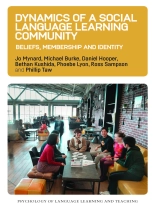This book provides an in-depth exploration of psychological phenomena affecting language learning within a social learning space. Drawing on the literature from identity in second language learning, communities of practice and learner beliefs, in conjunction with other individual difference factors, it uncovers perceptions and assumptions that language learners have of the space and how they affect their relationship with it and the people within it. Readers will gain a greater understanding of how psychological phenomena shape a space and how a learning space can contribute to a wider learning ecology. This book will appeal to researchers interested in language learning beyond the classroom and psychological aspects of language acquisition, as well as to practitioners and professionals who are supporting learners outside the classroom.
Innehållsförteckning
Part 1: Setting the Scene
Chapter 1. Introduction
Chapter 2. Social Learning Spaces
Chapter 3. The Japanese Educational Context
Chapter 4. Methodology
Part 2: Case Studies
Chapter 5. “If some freshman come to us, I said like, ‘please join us’.” Kokon’s Story
Chapter 6. “We see like the same people like every day so I feel like yeah it’s kind of like a community, Yellow Sofa community kind of thing.” Sina’s Story
Chapter 7. “Is it okay if I ignore grammar and just speak?” Kaede’s Story
Chapter 8. “Don’t be afraid of making mistakes.” Rintaro’s Story
Chapter 9. “I should be more confident in talking with people.” Sachiko’s Story
Chapter 10. “Just try is I think the most important thing”. Sayaka’s Story
Part 3: Exploring Concepts Through the Research
Chapter 11. Understanding Identity in a Social Learning Space
Chapter 12. Understanding Communities of Practice in a Social Language Learning Space
Chapter 13. Understanding Learner Beliefs and Other Individual Differences in a Social Learning Space
Chapter 14. Lessons Learnt from the Research Methods Applied in this Project
Part 4: Implications for the Field
Chapter 15. Summary of the Findings
Chapter 16. Implications and Practical Interventions
Om författaren
Ross Sampson is a lecturer at Kanda University of International Studies. He holds an MEd in TESOL from the University of Glasgow and has worked in the TESOL field since 2009, in Japan, South Korea, and Thailand, as well as on board a cruise ship. His research interests include reflection, learner autonomy, learner identity and self-access learning.












